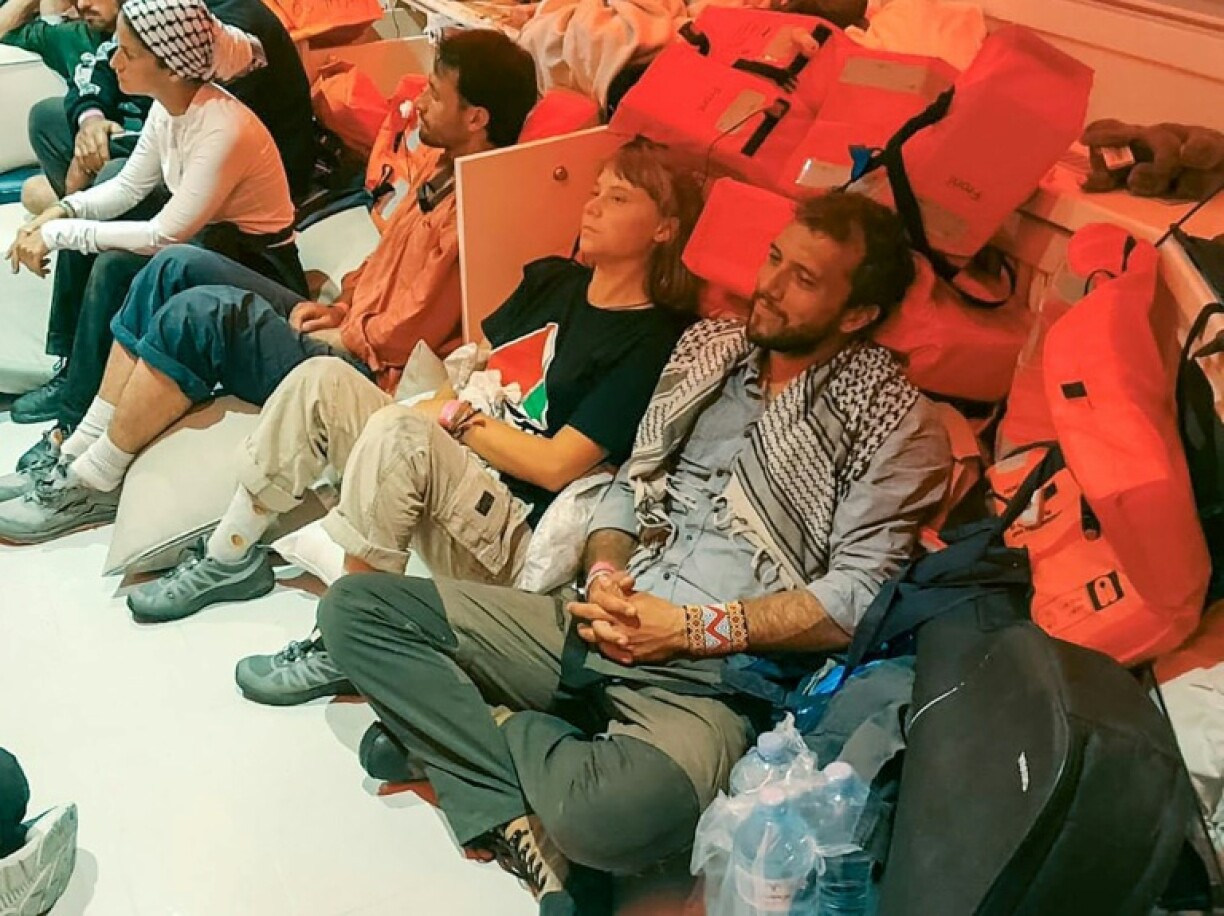
Since Wednesday night, media headlines have been pouring in about Israel’s interception of the Global Sumud Flotilla (GSF), a civilian-led convoy of boats carrying humanitarian aid to the blockaded Gaza Strip. The flotilla was stopped in international waters, approximately 90 nautical miles off Gaza. Among those on board were Greta Thunberg, several European politicians, and Luxembourgish participant Nora Rosa Fellens Huberty, all confirmed to be in Israeli custody as of Thursday evening.
The Israeli Foreign Ministry disputes international outcry, framing the operation as a peaceful rescue, but what does international law say? RTL Today reviewed the UN conventions and spoke to Amnesty Luxembourg’s director, David Pereira.
What makes this incident stand out is that it’s “another illegal maneuver in relation to international law, an additional one”, says Pereira. To him, it represents both a breach of international waters principles and a dismissal of the obligation to ensure civilians have access to food and medicine.
“It’s known that it’s incredibly difficult to supply the necessary food supplies as is, with reports of humanitarian trucks not being let into the Gaza Strip, and some people being shot when they seek to access those supplies.” The flotilla’s aim, Pereira explains, is not to resolve the humanitarian crisis but to raise awareness of that embargo. “About 40 small boats are involved in the flotilla; they’re not here to provide a large-scale humanitarian mission. And yet the Israeli government is going against international law by interfering in those waters.”
Customary international law as well as specific conventions reinforce his point: Wednesday’s interception goes against freedom of navigation on the high seas, Palestinian sovereignty over Gaza’s coast, and humanitarian law in armed conflict.
All of these are being played against a broader context in which the Israeli government’s actions are increasingly described as genocidal. In November 2024, the International Court of Justice (ICJ) ruled that Israel was creating “conditions of life calculated to bring about the destruction of part of the civilian population” in Gaza, and ordered it to allow immediate humanitarian access. Repeated interceptions of flotillas such as the GSF, as well as previous missions like the Madleen and Hamdala, only add another layer of violations.
Anne Lagerwall, professor of international law at the Free University of Brussels (ULB), writes that Israel has “no legal basis” to intercept the flotilla.
On the high seas, freedom of navigation is guaranteed under Article 87 of the UN Convention of the Law of the Sea (UNCLOS), which, given its customary nature, also applies to non-ratifying states like Israel.
Off the coast of Gaza, sovereignty lies with Palestine, since its accession to UNCLOS in 2015 – which carries even more legal weight with the growing state recognition. The Israeli government’s control over Gaza’s waters, Lagerwall argues, is thus a clear violation of the UN Charter.
That said, there are instances in which sea and land blockades are legal. Under the San Remo Manual, a state at war can establish maritime blockades as self-defence, but only under strict conditions: as long as they do not cause excessive harm to civilians, or prevent the adequate supply of food, medicine, and essential items.
Beyond this specific condition, customary international humanitarian law prohibits the deliberate starvation of civilians and any obstruction of essential supplies. Such principles apply regardless of whether the state in question has ratified the treaty, and protects “persons who are not or are no longer participating” in situations of armed conflict.
Combined with the long-standing land blockade, insufficient humanitarian access, and now repeated maritime interventions, one could read Israeli action to fall within the scope of the Genocide Convention.
“Israel does what it wants”, laments Pereira, “but the international community has a lot of room to maneuvre”. Given the repeated offences, and Donald Trump’s steady support of Benjamin Netanyahu, the Amnesty director sees more leverage in economic pressure than in civilian missions.
He points to Luxembourg’s financial role, particularly to the CSFF’s recent authorisation of Israeli bonds being brought to EU markets via Luxembourg. “Luxembourg could have a huge impact on Israel’s capacity to finance its war, far more than what the GSF alone can achieve.”
“For now, it’s a wait-and-see game”, says Pereira, who shows concern about the safety of the activists given past incidents. “There have been reports of torture, about the killings of humanitarian and medical staff, UN staff, journalists. It’s clear that civilian lives don’t matter here, Palestinian or not.”
Speaking to RTL on Thursday evening, Patrick Bosch of the Global March to Gaza confirmed that Nora is currently in Israeli custody and supported by a legal team of 20 to 30 lawyers working with the GSF. “We don’t know how long she’ll be there; it depends on whether she’s willing to sign a release document in which she would admit to having done something illegal”, Bosch explained. According to the representative, this waiting period spans around four to five days if the individual isn’t of special interest to the Israeli authorities. “In any case, that piece of paper is worthless, it has no legal value, but in the end it is up to Nora’s feelings and circumstances.”
In the past, Israeli officials did not criminally prosecute the activists and took to deportation procedures instead.
On the question of safety in custody, Bosch highlighted some sociological dynamics at play. “Nora is a European, white woman from a country that they don’t want to mess with too much. If she were a Tunisian man, I wouldn’t say the same. That’s the unfortunate, unjust reality.”